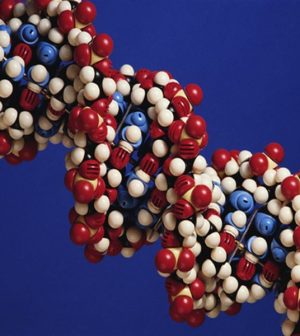- Could Your Grocery Store Meat Be Causing Recurring UTIs?
- Are You Making This Expensive Thermostat Error This Winter?
- Recognizing the Signs of Hypothyroidism
- 10 Strategies to Overcome Insomnia
- Could Artificial Sweeteners Be Aging the Brain Faster?
- Techniques for Soothing Your Nervous System
- Does the Water in Your House Smell Funny? Here’s Why
- Can a Daily Dose of Apple Cider Vinegar Actually Aid Weight Loss?
- 6 Health Beverages That Can Actually Spike Your Blood Sugar
- Treatment Options for Social Anxiety Disorder
Those At-Home DNA Tests Are an Imperfect Science

If you’re considering at-home DNA testing, there are some things you need to know, California State University experts say.
The popular tests are found in nearly every drugstore in the country, ranging in price from $60 to $100. People use them to learn more about their family heritage, discover unknown relatives or learn their potential risk for certain diseases.
But these tests can’t provide a complete genetic overview and they may put your privacy at risk.
“You can’t sequence a human genome for 100 bucks,” said Jason Bush, an associate professor of biology at Cal State.
At-home DNA tests capture only 500,000 to 1 million locations of your genome, providing only a “snapshot” of sections where mutations are known to occur, he explained in a university news release. And each company’s test may take a different snapshot.
In addition, there can be significant variation in test results, according to Colleen Greene, a genealogist and librarian.
“Ethnicity results at a continental or regional level are pretty accurate,” meaning the tests are good at telling you if your ancestors came from Northern Europe or East Africa, she explained. They’re less accurate in providing more specifics, such as exactly how Irish you are, Greene said.
But you’ll find the results very accurate if you’re trying to match your DNA against a database to find a family match, she added.
Any information about genetic health risk and genetic carrier status you get from an at-home DNA should taken with a grain of salt, Bush said. Risk does not translate to disease, and false positives (being told your risk for a disease is higher when it’s actually not) are common, he added.
If you have questions or concerns after using an at-home DNA test, discuss the results with your doctor, Greene advised.
Otherwise, be careful with your test results. Federal law prevents health insurers and companies with more than 15 employees from discriminating against people who are at significant genetic risk for diseases. But the law does not apply to life insurance, disability insurance or long-term care insurance.
Be aware that companies that make at-home DNA tests are amassing genetic data that could be used in research and in new business ventures.
If you’re helping a family member submit a test sample, you need to get informed consent, Greene added.
“They need to understand how the DNA will and can be used, and be made aware of the risk that if someone in their family has committed a crime, there is a potential for them to be discovered,” she said.
Bottom line: If you use an at-home DNA test, it might be wise to expect the unexpected.
“I tell people to go into it expecting a surprise,” Greene said. “I have worked with family members who find out they have a half-sibling or an unknown biological parent on the day the test results come back. It can be really upsetting for people.”
More information
The U.S. National Library of Medicine has more on direct-to-consumer genetic testing.
Source: HealthDay
Copyright © 2026 HealthDay. All rights reserved.










